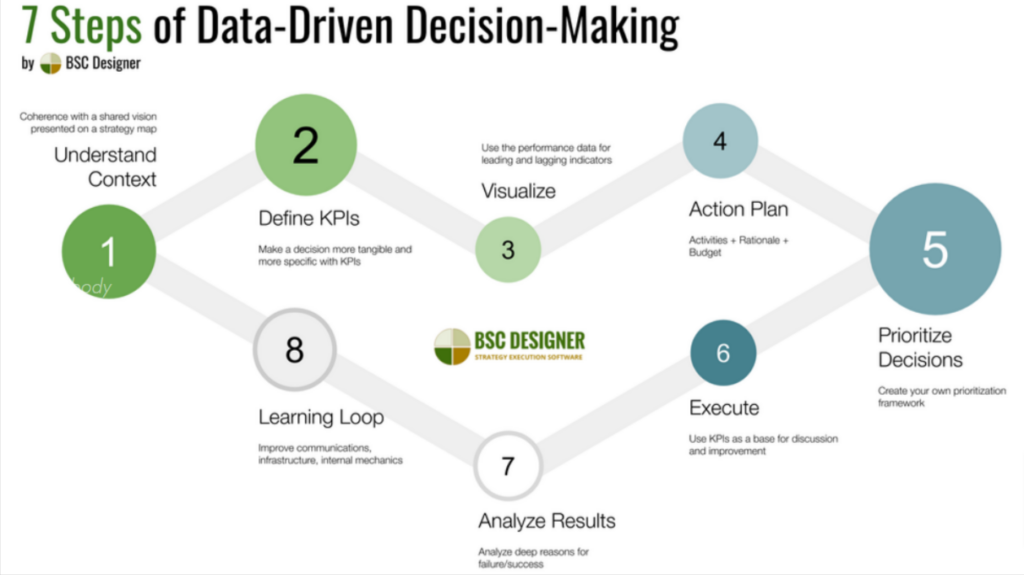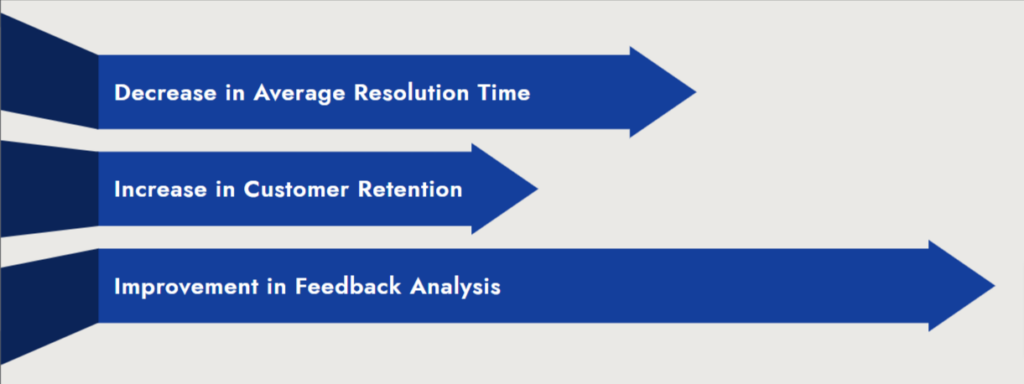Data has become central to efficient decision making in any organization which has drastically improved the business’ success. Businesses utilize data to make data driven decision making, work more efficiently, and gain an edge over their competitors. Whether it is HR, marketing, finance, or operations, a data-centered strategy offers an agile and proactive approach to business.
In this paper, we will focus on the significance of data orientated decision making, its consequences within differ business functions, and methods of integrating a data centric culture to enhance organizational performance and effectiveness.

For data driven insights, we need to collect qualitative and quantitative information and use it to guide business decisions instead of depending on one’s gut feelings or past experiences. A study conducted by PwC highlighted that data driven organizations overwhelmingly reported improvements to their decision-making capabilities, pacing their intuition relying counterparts by over three times. A survey from Forrester Research also revealed that although 74% of the respondents claim that they want to be more data driven, they fail to achieve effective analytics for tangible business results. Only 29% of those surveyed were successful implementing the desired changes.
Having a data driven approach to business decisions has proven to be more impactful than relying on intuition driven decision making. A study of companies which utilized data for decision making revealed that they were 23 times more likely to acquire new customers, six times more likely retain them, and were nineteen times more profitable than companies which avoided data driven decision making.
Why a Data-Driven Approach is Essential for Success?
- Increased Accuracy – Decisions carried out using data as a basis are more accurate and improve the outcomes of a target.
- Improved Operational Efficiency – Business process deficiencies are easily detectable and processes are streamlined.
- Better Risk Management – Utilizing predictive analytics, companies are able to foresee potential risks and work on averting them.
- Competitive Advantage – Companies can gain an upper hand over their competitors through the use of insights generated from available data.
How Data-Driven Insights Strengthen Business Strategy?
As illustrated by the information provided in the study of MIT Sloan Management Review, companies that thoroughly utilize data analytics are 5% more productive and 6% more profitable than their closest competitors. The nature of data driven insights goes beyond simply delivering feedback as they do provide feedback in real time. This enables the organizations to pivot and strategize almost instantaneously based on the performance data and market requirements.
Organizations can implement data driven insights across various departments generating more effective decisions and streamlined processes. Let’s examine the influence data has on the business processes.
1. Data Driven Recruitment and HR Strategies based on Data Analytics
HR departments have started implementing data centric recruitment in order to get the most qualified personnel onboard. Heuristic AI-enabled applicant tracking systems evaluate candidate qualifications, align prospective employees with positions, and, based on previous recruitment results, project potential employee success.
- Workforce Planning: Calculate forthcoming hiring requirements according to the market.
- Employee Retention: Study attrition figures to enhance employee satisfaction.
- Performance Management: Assess efficiency and level of engagement with the use of real-time analytics.
As an example, a report from LinkedIn claims that 69% of HR respondents indicate that data driven decision making has improved talent acquisition and engagement metrics and that the time to hire was lowered by 50%. Firms that utilize AI in HR have higher employee retention rates of up to 20%.
2. Marketing Optimization Through Data Driven Insights
While designing marketing campaigns, marketing teams analyze data to improve customer engagement and maximize return on investment. Through the use of data, businesses are able to:
- Examine Consumer Behavior: Monitor web visits, purchases, and activity analytics.
- Optimize Marketing Campaigns: Apply a forward-looking approach to present relevant content.
- Evaluate Campaign Performance: Evaluate orders, consumer loyalty, and prospects generated.
According to McKinsey, companies exploiting data on customer behavior are able to do 23% better in acquiring new customers and increase their revenue by 28%. Moreover, brands who analyze customer behavior in real-time are able to achieve an 80% increase in the effectiveness of their campaigns.
3. Data Analytics in Financial Data Driven Decision Making
Financial departments utilize data driven approaches to make decisions for budget allocation, risk management, and revenue projections. Organizations can:
- Monitor Financial Health: Use real-time dashboards for expense tracking.
- Improve Investment Strategies: Analyze historical data for better financial planning.
- Reduce Fraud and Errors: AI-driven risk assessment tools help prevent fraud and inaccuracies.
As per Deloitte, 73% of CFOs agreed that cost effective decision making assisted in boosting business performance which helped reduce financial risks by 25%. By adopting real time analytics, businesses are able to identify fraud methods 30% faster than with older systems, safeguarding against financial misallocation.
4. Improving Customer Service Through Data
Customer service departments utilize client data and feedback to increase loyalty and satisfaction. Chatbots and AI sentiment tools, combined with custom support offer systems, makes it possible to:
- Improve Response Times: With AI support, average resolution time is decreased by 40%.
- Enhance Customer Satisfaction: Over 35% of clients who receive data driven support do not switch over to other competitors.
- Optimize Feedback Analysis: Use AI tools to improve customer feedback trends.

Steps to Establish a Strong Data-Driven Culture in Organizations
Integrating effective data driven practices into organizational frameworks can be addressed with appropriate structures and resources. The following steps outline the most optimal practices for achieving seamless integration:
1. Develop an Appropriate Data Strategy
A data strategy lays the groundwork for proper business intel analytics and reporting. AI tools such as Power BI, Tableau, and Google Analytics allow businesses to gather and analyze data with greater effectiveness.
2. Foster Employee Confidence Towards Data
Harnessing Big Data: Best Practices and Business Applications from Harvard Business School suggested that 76% of employees reported lacking confidence in being able to effectively utilize data assets, whereas 92% of business executives considered data to be incredibly important. Training employees in data utilization tends to increase productivity by roughly 25-30%.
3. Increase Governance Around Compliance
The quality of the data held by a business is vital in making sound decisions. Businesses have to set out specific governance policies to ensure that data protection, accuracy, and compliance policies are adhered to, as this is vital in ascertaining sound business decisions.
4. Employ Continuous Improvement Strategies with Data
Promoting the collection of employee generated data is fundamental to effective decision making, as employees are involved in all the appropriate stages of the process. This enables businesses to achieve a step change in performance compared to other businesses. Studies demonstrate that companies that integrate a data culture consistently outperform their peers in profitability by 5 to 10%.
Future Trends in Data Driven Decision Making
As technology evolves, the future of data driven decision making will be shaped by emerging trends such as:
- AI-Powered Predictive Analytics: Businesses will increasingly rely on AI to forecast trends, anticipate customer behavior, and automate decision-making.
- Real-Time Data Insights: Organizations will leverage real-time analytics for immediate decision-making, reducing response time to market changes.
- Data Driven Automation: More companies will integrate AI-driven automation into HR, finance, and operations for improved efficiency.
- Ethical Data Use and Compliance: As data privacy regulations become stricter, businesses must ensure ethical data collection and transparency in decision-making.
Conclusion
Based on the direct change, it is a must for any business to leverage data in its decision making processes. To seize competitive advantages, organizations need to utilize data driven insights as it will enhance their Recruitment, Marketing, Finance, and Customer Service departments, thus leading to better and profitable business operations.Improve your decision making tactics with powerful workforce data. Sign up on JobsPikr today and start utilizing real-time analytics to boost your business strategies!



